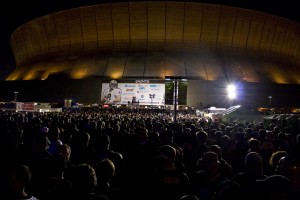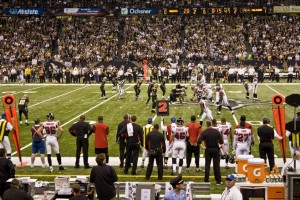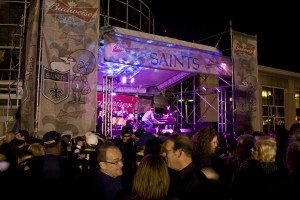It’ll be almost five years that I’ve been working in Phnom Penh. Like other nomads there is no “home” for me. I miss the familiar comforts of family and friends and a community built around a settled life. I miss the food, the law and order, and the extensive range of entertainment and options. But while memories of my time in New Orleans is not as extensive as those of my husband’s who grew up on its outskirts, of all places I’ve lived it is this much maligned, recently battered and often misunderstood city that inspired most my imagination. Here in this city was one of the more waking periods of my life – my greatest risks and biggest mistakes, and some very big decisions. Photos by Keith Kelly.
This year on our visit back we were treated to a surprise by some very good friends – tickets to a Saints game at the Superdome, where they beat their biggest rival the Atlanta Falcons. It’s a side of the city I never partook in, not normally being a sports fan, but it’s a subculture as part of the essence of New Orleans as jazz itself.
Here is an excerpt from an excellent piece on the Saints and the Soul of America’s City, by Wright Thompson. It’s a long piece worth reading, for anyone who has ever lived and loved this amazing city.
Where do you even begin? Maybe you describe the couture shops that have replaced the latest fashions on the storefront mannequins with Saints T-shirts? Maybe you tell how vampire novelist and native New Orleanian Anne Rice, never much of a football fan and now living on the West Coast, recently ordered a Drew Brees jersey with “Anne” on the back. Maybe you use numbers: 84 percent of the televisions in town were tuned to the recent Monday night game against the Patriots. Maybe you use bizarre trends, such as an NOPD cop telling me the 911 calls almost stop when the Saints play and there’s been only one murder during a game this year…
All of them — Besh, LeBlanc, Brees, Payton, Bush — they are all part of this first generation of post-Katrina successful New Orleanians. They are building a city from scratch, and people see them every day, working, adopting charities, enjoying life, sitting at the next table or listening to the same band. Katrina almost destroyed the city but, if you look closely, you’ll find that it did something else: It strengthened it, made the people who loved it love it even more. Everyone left the city, so no one is here because of inertia. They chose to come back…
.. the drive out of New Orleans, through a city still battered, past the exits for the Vieux Carre and Uptown, past the Huey Long, which runs narrow and high out to the leaning oyster and chicken shack. ..It is decayed on the outside, but inside there is life. Here is a citizenry that believes in the power of the underdog. New Orleanians fell first and see something the rest of America is blind to right now: a way back into the light.




